-

新人教版高中英语必修3Unit 4 Space Exploration-Reading and Thinking教学设计一
Q4: What is the function of the International exploration ?Having astronauts from different countries on boardQ5: What can you learn from Para 4 ?China has made great achievements in exploring spaceQ6: What is the attitude to the space exploration ?SupportiveStep 6 Post reading---RetellPeople have always wanted to learn more about space. Before the mid-20th century, most people felt (1)_________ (travel) into space was an impossible dream. However, (2)____ the help of scientists, peoplesucceeded in realizing their dream (3) _________ (explore) space. On 4 October 1957, the Sputnik 1 satellite (4) ____________(launch) by the USSR. (5) ________________ scientists try to make sure nothing goes wrong, accidents can still happen. These disasters made everyone(6)___________(disappoint), but people still believe in the importance of (7) ________(carry) on space exploration. In 2003, China became the third country to (8)_____________ (independent) send humans into space. Then Shenzhou 6 and 7 completed (9)____ second manned orbit and the first Chinese spacewalk. In spite of the difficulties, scientists hope future (10)__________ (discovery) will not only enable us to understand the universe but also help us survive well into the future.Answers: 1. travelling 2. with 3. to explore 4. was launched 5. Although6. disappointed 7. carrying 8. independently 9. a 10. discoveriesStep 6 Post reading---Critical thinkingQ1: What do you think of the space exploration ? I think it is beneficial to us. Through further study of space, people will make full use of it in the future, such as the space experiments by Wang Yaping in Tian Gong 1.Q2: If you are determined to be an astronaut, what should you prepare at present ?First of all, I should study hard to get a related college degree. Besides, I must keep mental and physical healthy.Step 7. HomeworkTry to summarize the structure of the article by a mind map.

新人教版高中英语必修3Unit 4 Space Exploration-Reading For Writing教学设计一
另一方面,其余的人反对这个计划,因为它可能会导致一些不好的影响。7.I hold the belief that space exploration not only enable us to understand how the universe began but also help us survived well into the future.我坚信探索太空不仅能够使我们了解宇宙的起源而且能够帮助我们更好地走进未来。8.I think we should spend more time and money exploring space so as to provide new and better solutions to people's shortterm and longterm problems.为了给人类的短期和长期问题提供更新和更好的解决方法,我认为我们应该花更多的时间和金钱来探索太空。9.From my point of view,it is wrong of young people to depend on their telephones too much,which may do harm to both their physical and mental health.在我看来,年轻人过度依赖手机是不对的,因为它们可能会对他们的身心健康都有害。最近你班同学就“人类是否应该进行宇宙探索”这个问题进行了激烈的讨论。有人认为,探索宇宙不仅让人类更好地了解宇宙的发展,还可以用来指导农业生产,以及把一些探索太空的高新技术用于现实生活;也有一些人认为探索太空花掉了大量的人力物力;影响了人们的生活水平。请你根据以下情况写一篇报告并发表自己的观点。注意:1.写作内容应包括以上全部要点,可适当发挥,使上下文连贯;

新人教版高中英语必修3Unit 5 The Value of Money-Listening &Speaking&Talking教学设计
4. A:We’d like to have someone to say a word at the beginning to welcome the group.B:↙Who?A:We thought that you or Dr.Johnson might do it.B用降调说Who,其意思是问,对方想让谁在开场时致欢迎词。Step 6 Pronunciation---Practice1. Listen to the short conversation and mark the intonation with ↗, ↙ or ↙, ↗. Then discuss with a partner what they intend to convey by using different intonation.Owner: You know what ?↗ It’s a million-pound bank note↙.Waiter 1: Really ?↗(question)Waiter 2: Really !↙(unbelievable and surprised)Waiter 3: Really ?!↙↗(first question then surprised)2. Listen to the conversations. Underline the parts that are stressed and mark the intonation. Then talk about the implied meanings of the responses with different intonations. Listen again and repeat.1) Henry: It’s a nice suit.Owner: Oh, it’s perfect!↙(The intonation means it is very suitable for Henry.)2) Henry: Well, that’s very kind of you.Owner: Kind, sir ?↗(what you said is not right) No, it’s kind of you. You must come whenever you want and have whatever you like. Just having you sit here is a great honour !!↙(welcome you to come again)3)Henry:Well, to be honest, I have none. Oliver:(happily) What luck!(excited) Brother↗, what luck!↙(It means “Didn’t you hear it?”)Henry: Well, it may seem lucky to you but not to me!↗(angry) If this is your idea of some kind of joke, I don’t think it’s very funny. Now if you’ll excuse me, I ought to be on my way.↙(If so, I would leave.)Roderick: Please don’t go↙...(hope Henry can wait for a moment)Part B Viewing and Talking---Describe people’s changing attitudes in a film clipStep 1 Before-listening---Tell the filmYou are going to watch part of the film The Million Pound Bank Note. Look at these photos and guess what happens in the film.

新人教版高中英语必修3Unit 5 The value of money-Reading and Thinking教学设计二
? Could you offer me some kind of work here?? I don’t want your charity, I just want an honest job.? Careless: I landed in Britain by accident.Step 7:Consolidation.? Find Henry? Roderick and Oliver were I .making a bet when they saw Henry, a poor young man. ? Know Henry? About a month ago, Henry was sailing and later he found himself carried out to sea by a strong wind. Fortunately, he 2.was spotted by a ship. And it was the ship that brought him to 3.England? Offer money to Henry ? Oliver and Roderick gave Henry a letter and told him that there was money in it. They 4.persuaded him to accept it, and made him 5.promise that it wouldn't be opened until 2 o'clock.Step 8:Language pointsa large amount of: a large quantity of; a great deal ofe.g. They bought a large amount of furniture before they moved their new house.make a bet: make an arrangement to risk money, etc. on an event of which the result is doubtful.e.g. We made a bet on the result of the match.permit sb to do something: allow somebody to do somethinge.g. My mother doesn’t permit me to ride in the street after it rained.by accident: as a result of chancee.g. I only found it by accident.stare at: look at somebody or something with the eyes wide open in a fixed gaze( in astonishment, wonder, fear, etc)to be honest: to tell you the truth; to be franke.g. To be honest, I don’t think we have a chance of winning.Step7 Homework:What do you think will happen to Henry? Will the bank-note help him or get him into trouble?

新人教版高中英语必修3Unit 5 The Value of Money-Reading for Writing教学设计二
2. 您能看到, 我头发太长了。You can see that my hair is much too long.3. 无论什么时候, 只要您想回来就回来。Please come back whenever you want.4. 您仅有很少的头发要理! You only have too little hair to cut !5. 为您服务是我的荣幸!It is my honour to serve you!Step 9 Writing(Henry is walking down the street when he sees a sign for a place that cuts hair. He decides to have it cut. )H=Henry B=BarberH: Good afternoon, I’d like to have my hair cut, if I may. (The barber looks at Henry’s hair and continues cutting another man’s hair. ) Er, I’d really like a haircut. As you can see it’s much too long. B: (in a rude manner) Yes, I can see that. Indeed, I can. H: Fine, well, I’ll have a seat then. (He sits in one of the barber’s chairs. The barber turns to look at Henry. )B: It’s quite expensive here, you know! Are you sure you can afford it?H: Yes. I think so. (After his hair is cut, the barber tells Henry how much he must pay. Henry shows the barber the bank note. )B: Why Mr. . . (looks shocked)H: Adams. Henry Adams. I’m sorry. I don’t have any change. B: Please don’t worry! (wearing a big smile) Nothing to worry about! Nothing at all! Please come back whenever you want, even if you only have too little hair to cut! It will be my honour to serve you!Step 10 Pair workExchange drafts with a partner. Use this checklist to help your partner revise his/her draft.1. Are all the elements of a play included and in good order ?2. Do the character use suitable language ?3. Are the stage directions clear and useful ?4. Is the plot clear and exciting enough ?

新人教版高中英语必修3Unit 5 the value of money-Reading For Writing教学设计一
【参考范文】Narrator:(Henry is smiling as he leaves the restaurant. As he is walking down the street, he sees a sign for a place that cuts hair. He decides to get it cut. )H=Henry;B=Barber;R=rude manH:Good afternoon, I'd like to get a cut, if I may. (The barber looks at Henry's hair and continues cutting another man's hair. )Er, I'd really like a haircut. As you can see it's much too long. B:(in a rude manner) Yes, I can see that. Indeed, I can. H:Fine, well I'll have a seat then. (He sits in one of the barber's chairs. The barber turns to look at Henry. )B:It's quite expensive here, you know!Are you sure you can afford it?H:Yes. I think so. (In comes the rude man. )R:Hey you there. I need a haircut quickly. Can you do me straightaway?B:All right, then, get in the chair and I'll see what I can do. R:Thank you. (sits down in one of the barber's chairs)H:Excuse me, but I was here first. Aren't you going to do my hair first?B:This man's in a hurry. H:Well so am I!I insist that you cut my hair first. B:OK, but I'll have to be quick. This gentleman is waiting. H:Thank you. (They both become quiet. After his hair is cut, the barber tells Henry how much he must pay. Henry shows the barber the bank note. )B:Why, Mr . . . (looks shocked)H:Adams. Henry Adams. I'm sorry, I don't have any change. R:You're that Mr Adams! Well,I'm glad I waited or I might never have known it was you. B:Why, Mr Adams, please don't worry!(wearing a big smile) Nothing to worry about!Nothing at all!Please come back any time, even if you only need too little hairs cut!It will be my honour to serve you!

新人教版高中英语选修2Unit 1 Science and Scientists-Discovering useful structures教学设计
The grammatical structure of this unit is predicative clause. Like object clause and subject clause, predicative clause is one of Nominal Clauses. The leading words of predicative clauses are that, what, how, what, where, as if, because, etc.The design of teaching activities aims to guide students to perceive the structural features of predicative clauses and think about their ideographic functions. Beyond that, students should be guided to use this grammar in the context apporpriately and flexibly.1. Enable the Ss to master the usage of the predicative clauses in this unit.2. Enable the Ss to use the predicative patterns flexibly.3. Train the Ss to apply some skills by doing the relevant exercises.1.Guide students to perceive the structural features of predicative clauses and think about their ideographic functions.2.Strengthen students' ability of using predicative clauses in context, but also cultivate their ability of text analysis and logical reasoning competence.Step1: Underline all the examples in the reading passage, where noun clauses are used as the predicative. Then state their meaning and functions.1) One theory was that bad air caused the disease.2) Another theory was that cholera was caused by an infection from germs in food or water.3) The truth was that the water from the Broad Street had been infected by waste.Sum up the rules of grammar:1. 以上黑体部分在句中作表语。2. 句1、2、3中的that在从句中不作成分,只起连接作用。 Step2: Review the basic components of predicative clauses1.Definition

新人教版高中英语选修2Unit 1 Science and Scientists-Learning about Language教学设计
Step 7: complete the discourse according to the grammar rules.Cholera used to be one of the most 1.__________ (fear) diseases in the world. In the early 19th century, _2_________ an outbreak of cholera hit Europe, millions of people died. But neither its cause, 3__________ its cure was understood. A British doctor, John Snow, wanted to solve the problem and he knew that cholera would not be controlled _4_________ its cause was found. In general, there were two contradictory theories 5 __________ explained how cholera spread. The first suggested that bad air caused the disease. The second was that cholera was caused by an _6_________(infect) from germs in food or water. John Snow thought that the second theory was correct but he needed proof. So when another outbreak of cholera hit London in 1854, he began to investigate. Later, with all the evidence he _7_________ (gather), John Snow was able to announce that the pump water carried cholera germs. Therefore, he had the handle of the pump _8_________ (remove) so that it couldn't be used. Through his intervention,the disease was stopped in its tracks. What is more, John Snow found that some companies sold water from the River Thames that __9__________________ (pollute) by raw waste. The people who drank this water were much more likely _10_________ (get) cholera than those who drank pure or boiled water. Through John Snow's efforts, the _11_________ (threaten) of cholera around the world saw a substantial increase. Keys: 1.feared 2.when 3. nor 4.unless 5.that/which 6.infection 7.had gathered 8.removed 9.was polluted 10.to get 11. threat

新人教版高中英语选修2Unit 1 Science and Scientists-Reading and thinking教学设计
Step 5: After learning the text, discuss with your peers about the following questions:1.John Snow believed Idea 2 was right. How did he finally prove it?2. Do you think John Snow would have solved this problem without the map?3. Cholera is a 19th century disease. What disease do you think is similar to cholera today?SARS and Covid-19 because they are both deadly and fatally infectious, have an unknown cause and need serious public health care to solve them urgently.keys:1. John Snow finally proved his idea because he found an outbreak that was clearly related to cholera, collected information and was able to tie cases outside the area to the polluted water.2. No. The map helped John Snow organize his ideas. He was able to identify those households that had had many deaths and check their water-drinking habits. He identified those houses that had had no deaths and surveyed their drinking habits. The evidence clearly pointed to the polluted water being the cause.3. SARS and Covid-19 because they are both deadly and fatally infectious, have an unknown cause and need serious public health care to solve them urgently.Step 6: Consolidate what you have learned by filling in the blanks:John Snow was a well-known _1___ in London in the _2__ century. He wanted to find the _3_____ of cholera in order to help people ___4_____ it. In 1854 when a cholera __5__ London, he began to gather information. He ___6__ on a map ___7___ all the dead people had lived and he found that many people who had ___8____ (drink) the dirty water from the __9____ died. So he decided that the polluted water ___10____ cholera. He suggested that the ___11__ of all water supplies should be _12______ and new methods of dealing with ____13___ water be found. Finally, “King Cholera” was __14_____.Keys: 1. doctor 2. 19th 3.cause 4.infected with 5.hit 6.marked 7.where 8.drunk 9.pump 10.carried 11.source 12.examined 13.polluted 14.defeatedHomework: Retell the text after class and preview its language points

新人教版高中英语选修2Unit 2 Bridging Cultures-Discovering useful structures教学设计
The grammar of this unit is designed to review noun clauses. Sentences that use nouns in a sentence are called noun clauses. Nominal clauses can act as subject, object, predicate, appositive and other components in compound sentences. According to the above-mentioned different grammatical functions, nominal clauses are divided into subject clause, object clause, predicate clause and appositive clause. In this unit, we will review the three kinds of nominal clauses. Appositive clauses are not required to be mastered in the optional compulsory stage, so they are not involved.1. Guide the students to judge the compound sentences and determine the composition of the clauses in the sentence.2. Instruct students to try to learn grammar by generalizing grammar rules, controlling written practice, and semi-open oral output.3. Inspire the students to systematize the function and usage of noun clause1.Instruct students to try to learn grammar by generalizing grammar rules, controlling written practice, and semi-open oral output.2.Inspire the students to systematize the function and usage of noun clauseStep1: The teacher ask studetns to find out more nominal clauses from the reading passage and udnerline the nominal clauses.

新人教版高中英语选修2Unit 3 Food and Culture-Reading and thinking教学设计
The discourse explores the link between food and culture from a foreign’s perspective and it records some authentic Chinese food and illustrates the cultural meaning, gerography features and historic tradition that the food reflects. It is aimed to lead students to understand and think about the connection between food and culture. While teaching, the teacher should instruct students to find out the writing order and the writer’s experieces and feelings towards Chinese food and culture.1.Guide the students to read the text, sort out the information and dig out the topic.2.Understand the cultural connotation, regional characteristics and historical tradition of Chinese cuisine3.Understand and explore the relationship between food and people's personality4.Guide the students to use the cohesive words in the text5.Lead students to accurately grasp the real meaning of the information and improve the overall understanding ability by understanding the implied meaning behind the text.1. Enable the Ss to understand the structure and the writing style of the passage well.2. Lead the Ss to understand and think further about the connection between food and geography and local character traits.Step1: Prediction before reading. Before you read, look at the title, and the picture. What do you think this article is about?keys:It is about various culture and cuisine about a place or some countries.
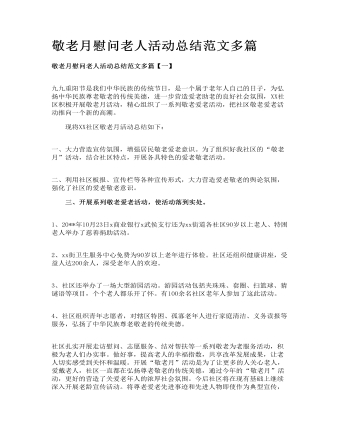
敬老月慰问老人活动总结范文多篇
一、大力营造宣传氛围,增强居民敬老爱老意识。为了组织好我社区的“敬老月”活动,结合社区特点,开展各具特色的爱老敬老活动。 二、利用社区板报、宣传栏等各种宣传形式,大力营造爱老敬老的舆论氛围,强化了社区的爱老敬老意识。 三、开展系列敬老爱老活动,使活动落到实处。 1、20**年10月23日x商业银行x武侯支行还为xx街道各社区90岁以上老人、特困老人举办了慈善捐助活动。 2、xx街卫生服务中心免费为90岁以上老年进行体检。社区还组织健康讲座,受益人达200余人,深受老年人的欢迎。 3、社区还举办了一场大型游园活动。游园活动包括夹珠珠、套圈、扫篮球、猜谜语等项目,个个老人都乐开了怀。有100余名社区老年人参加了这此活动。 4、社区组织青年志愿者,对辖区特困、孤寡老年人进行家庭清洁、义务读报等服务,弘扬了中华民族尊老敬老的传统美德。 社区扎实开展走访慰问、志愿服务、结对帮扶等一系列敬老为老服务活动,积极为老人们办实事。做好事,提高老人的幸福指数,共享改革发展成果,让老人切实感受到关怀和温暖。开展“敬老月”活动是为了让更多的人关心老人,爱戴老人,社区一直都在弘扬尊老敬老的传统美德,通过今年的“敬老月”活动,更好的营造了关爱老年人的浓厚社会氛围。今后社区将在现有基础上继续深入开展老龄宣传活动。将尊老爱老先进事迹和先进人物即使作为典型宣传,加大尊老爱老,助老惠老的宣传力度,唤起大家尊老敬老的社会意识,为老年人实实在在地做好事,解决实际困难,充分发挥社区为老活动的实际作用。
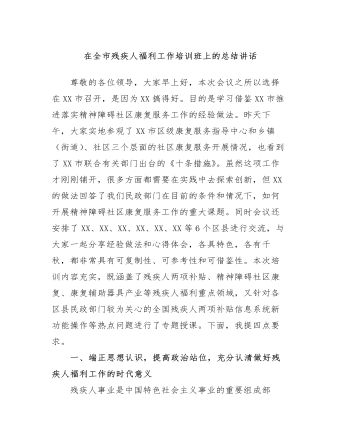
在全市残疾人福利工作培训班上的总结讲话
四、务求工作实效,主动担当作为,将培训效果转化为推进残疾人福利工作的崭新起点当前,残疾人福利工作面临任务重、责任大、事情多、压力大的情况,发展中也遇到一些临时性困难,希望在座的各位副局长、科长以此次培训为契机,找准薄弱环节,真抓实干,将培训成果转化为开拓创新的思路、方法、技巧。一要抓好重点工作评估。残疾人福利政策事关残疾人的切身利益,社会各界广泛关注。促进残疾人事业发展,改善残疾人生存状况,仍然是当前一项重要而紧迫的任务。今年是残疾人福利工作纳入民政部重点工作评估的第一年,大家要把培训内容与评估指标结合起来对标对表,对各项业务做一次大体检,做到以训促干、以评带干,将各项残疾人福利政策落实落细落准。
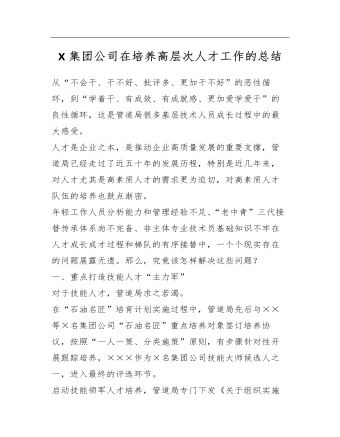
X集团公司在培养高层次人才工作的总结
投运公司围绕“两外两型”(海外、系统外;管理型、技术型)、聚焦“两新两高”(新型模式、新兴业务;高端人才,高效市场),创新人才职业发展通道,打造了“经营管理+项目管理+专业技术+技能操作”4条通道、5个岗位序列、××个层级的投产运行专业化人才队伍。削弱级别概念,实现经营管理岗级一体化;搭建项目管理人才通道,建立了适用于公司“项目群”和以站场为基本管理单元的项目经理序列和基层站队长序列岗位选聘制;实行专业技术“双通道”聘任制,为多渠道引进的人才提供职业晋升通道。检测公司依照相关管理办法,成立资质取证培训工作领导小组,负责取证培训工作的统一部署和协调工作,由公司经理任组长,层层压实责任。公司人事部负责提供检验检测人员报考所需的各项业绩证明材料,指导相关单位和报考员工进行培训考试的申请和预约,对培训考试报名过程中产生的各种问题进行沟通与协调,相关成员单位负责资质取证培训工作的具体组织和实施,处理好工学矛盾,确保员工能按时参加相关培训和考试。
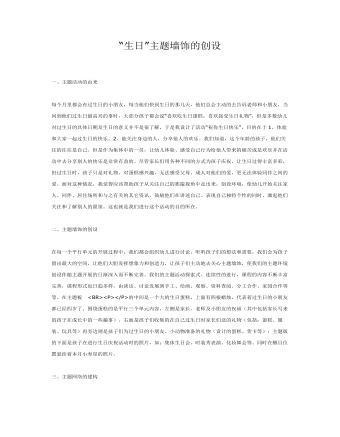
中班主题课件教案:“生日”主题墙饰的创设
目的在于1、体验和大家一起过生日的快乐。2、能关注身边的人,分享他人的欢乐。我们知道,这个年龄的孩子,他们关注的往往是自己。但是作为集体中的一员,让幼儿体验、感受自己行为给他人带来的痛苦或是欢乐并在活动中去分享别人的快乐是非常有益的。尽管家长们用各种不同的方式为孩子庆祝,让生日过得丰富多彩,但过生日时,孩子只是对礼物、对蛋糕感兴趣,无法感受父母、成人对他们的爱,更无法体验同伴之间的爱。面对这种情况,我觉得应该帮助孩子从关注自己的狭隘视角中走出来,创设环境,使幼儿开始关注家人、同伴、居住场所和与之有关的其它资讯,鼓励他们在讲述自己、表现自己独特个性的同时,激起他们关注和了解别人的愿望。这也就是我们进行这个活动的目的所在。二、主题墙饰的创设在每一个平行单元的开展过程中,我们都会组织幼儿进行讨论,听听孩子们的想法和需要,我们会为孩子留出最大的空间,让他们大胆发挥想象力和创造力,让孩子们主动地去关心主题墙饰,使我们的主题环境创设伴随主题开展的日渐深入而不断完善。我们的主题活动探索式、连续性的进行,课程的内容不断丰富完善,课程形式也日趋多样,由谈话、讨论发展到手工、绘画、观察、资料查阅、分工合作、家园合作等等。在主题板 的中间是一个大的生日蛋糕,上面有四根蜡烛,代表着过生日的小朋友都已经四岁了。围绕蛋糕的是平行三个单元内容,左侧是家长、老师及小朋友的祝福(其中包括家长写来的孩子在成长中的一些趣事)。右面是孩子们收集的在自己过生日时家长们送的礼物(包括:蛋糕、服装、玩具等)再旁边则是孩子们为过生日的小朋友、小动物准备的礼物(设计的蛋糕、贺卡等);主题版的下面是孩子在进行生日庆祝活动时的照片,如:集体生日会、时装秀表演、化妆舞会等。同时在醒目位置悬挂着本月小寿星的照片。
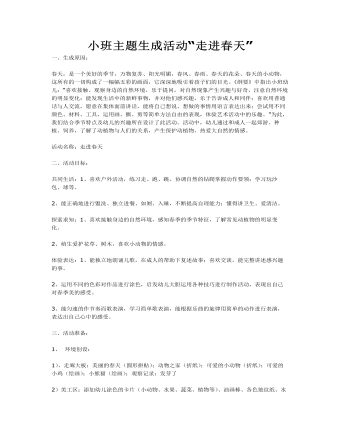
小班主题生成活动“走进春天”课件教案
二、活动目标:共同生活:1、喜欢户外活动,练习走、跑、跳、协调自然的钻爬掌握动作要领;学习玩沙包、球等。2、能正确地进行盥洗、独立进餐、如厕、入睡,不断提高自理能力;懂得讲卫生、爱清洁。探索求知:1、喜欢接触身边的自然环境,感知春季的季节特征,了解常见动植物的明显变化。2、萌生爱护花草、树木,喜欢小动物的情感。体验表达:1、能独立地朗诵儿歌,在成人的帮助下复述故事;喜欢交谈,能完整讲述感兴趣的事。2、运用不同的色彩对作品进行涂色,启发幼儿大胆运用各种技巧进行制作活动,表现出自己对春季美的感受。3、能匀速的作节奏而歌表演,学习简单歌表演,能根据乐曲的旋律用简单的动作进行表演,表达出自己心中的感受。
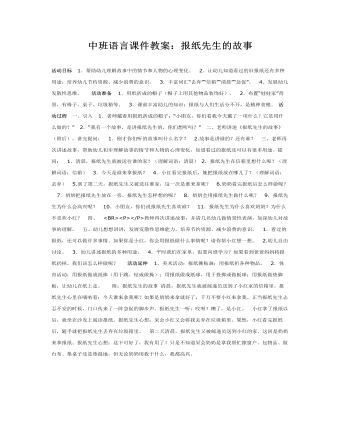
中班语言课件教案:报纸先生的故事
活动准备 1.用纸折成的帽子(帽子上用其他物品装饰好)。 2.布置“娃娃家”背景,有椅子、桌子、垃圾箱等。 3.课前丰富幼儿的知识:报纸与人们生活分不开,是精神食粮。活动过程 一、引入 1.老师戴着用报纸折成的帽子:“小朋友,你们看我今天戴了一项什么?它是用什么做的?” 2.“我有一个故事,是讲报纸先生的,你们想听吗?” 二、老师讲述《报纸先生的故事》(附后),讲完提问: 1.刚才你们听的故事叫什么名字? 2.故事是讲谁的?还有谁? 三、老师再次讲述故事,帮助幼儿初步理解故事的情节和人物的心理变化,知道看过的报纸还可以有很多用途。提问: 1.清晨,报纸先生就被送往谁的家?(理解词语:清晨) 2.报纸先生在信箱里想什么呢?(理解词语:信箱) 3.今天是谁来拿报纸? 4.小红看完报纸后,她把报纸放在哪儿了?(理解词语:丢弃) 5.到了第二天,报纸先生又被送往谁家,这一次是谁来拿呢? 6.奶奶看完报纸后怎么样做呢? 7.奶奶把报纸先生放在一旁,报纸先生怎样想的呢? 8.奶奶会用报纸先生做什么呢? 9.报纸先生为什么会高兴呢? 10.小朋友,你们说报纸先生喜欢谁? 11.报纸先生为什么喜欢奶奶?为什么不喜欢小红? 四、 教师再次讲述故事,并请几名幼儿做情景性表演,加深幼儿对故事的理解。 五、幼儿想想讲讲,发展发散性思维能力,培养节约资源、减少浪费的意识。 1.看过的报纸,还可以做许多事情。如果你是小红,你会用报纸做什么事情呢?请你帮小红想一想。 2.幼儿自由讨论。 3.幼儿讲述报纸的多种用途。
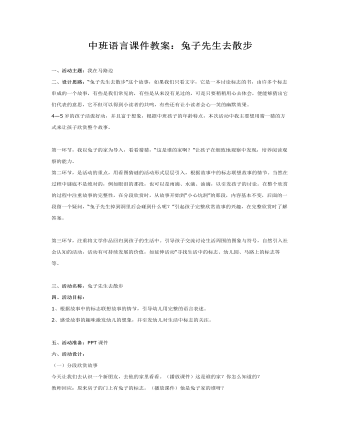
中班语言课件教案:兔子先生去散步
第一环节,我以兔子的家为导入,看看猜猜,“这是谁的家啊?”让孩子在细致地观察中发现,培养阅读观察的能力。第二环节,是活动的重点,用看图猜谜的活动形式层层引入,根据故事中的标志联想故事的情节。当然在过程中谜底不是绝对的,例如眼泪的那段,也可以是雨滴、水滴、油滴,以引发孩子的讨论。在整个欣赏的过程中注重故事的完整性,在分段欣赏时,从故事开始到“小心坑洞”的那段,内容基本不变,后面的一段留一个疑问,“兔子先生掉到洞里后会碰到什么呢?”引起孩子完整欣赏故事的兴趣,在完整欣赏时了解答案。 第三环节,注重将文学作品回归到孩子的生活中。引导孩子交流讨论生活周围的图象与符号,自然引入社会认知的活动,活动有可持续发展的价值,如延伸活动“寻找生活中的标志、幼儿园、马路上的标志等等。
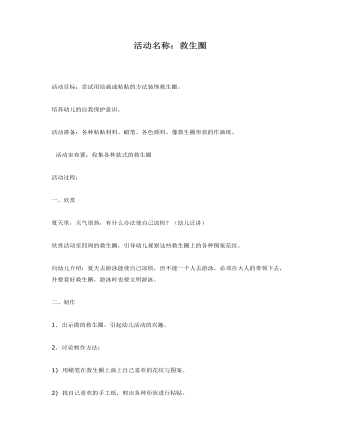
中班美术活动——救生圈课件教案
培养幼儿的自我保护意识。活动准备:各种粘贴材料、蜡笔、各色颜料。像救生圈形状的作画纸。 活动室布置:收集各种款式的救生圈活动过程:一、欣赏夏天里,天气很热,有什么办法使自己凉快?(幼儿泛讲)欣赏活动室四周的救生圈,引导幼儿观察这些救生圈上的各种图案花纹。向幼儿介绍:夏天去游泳能使自己凉快,但不能一个人去游泳,必须在大人的带领下去,并要套好救生圈,游泳时也要文明游泳。
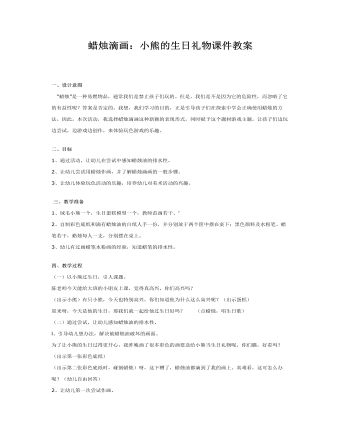
蜡烛滴画:小熊的生日礼物课件教案
二、目标1、通过活动,让幼儿在尝试中感知蜡烛油的排水性。2、让幼儿尝试用蜡烛作画,并了解蜡烛滴画的一般步骤。3、让幼儿体验玩色活动的乐趣,培养幼儿对美术活动的兴趣。 三、教学准备1、绒毛小熊一个,生日蛋糕模型一个,教师范画若干、’2、自制彩色底纸和滴有蜡烛油的白纸人手一份,并分别放于两个筐中摆在桌下;黑色颜料及水粉笔、蜡笔若干,蜡烛每人一支,分别摆在桌上。3、幼儿有过画蜡笔水粉画的经验,知道蜡笔的排水性。四、教学过程(一)以小熊过生日,引人课题。陈老师今天能给大班的小朋友上课,觉得真高兴,你们高兴吗?(出示小熊)有只小熊,今天也特别高兴,你们知道他为什么这么高兴呢?(出示蛋糕)原来呀,今天是他的生日,那我们就一起给他过生日好吗? (点蜡烛,唱生日歌)



